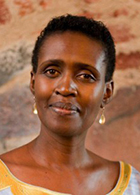|
Progressive taxation and a fairer global tax framework are essential to rebuilding trust and to ensuring that policymaking is not captured by the “1%”.
We live in a world where the 85 richest people own the wealth of half of the world's population. The biggest benefits of growth are being captured by a tiny elite–an enormous threat to stable, inclusive political and economic systems. Instead of moving forward together, people are separated by economic and political power. Massive concentrations of income and wealth weaken the checks and balances meant to ensure that majorities are heard, heighten social tensions and erode the social contract between citizens and the state.
As a result, the rise of economic inequality is shattering global public trust in government and financial institutions.
The World Economic Forum has reported that global elites rank widening income disparities as the second greatest worldwide risk in the coming 12 to 18 months. Global polling by the Pew Research Center suggests that people in all regions of the world are concerned about rising inequality. And Oxfam’s own polling has revealed an overwhelming sentiment, across developed and developing countries, that laws and regulations are designed to benefit the rich. A survey in six countries–Spain, Brazil, India, South Africa, the UK and the US–showed that most people now believe laws are skewed in favour of the rich. Similarly, most agreed with the statement, “The rich have too much influence over where this country is headed”.
Among these skewed and mistrusted laws: outdated and unfair international tax rules.
In the last 30 years, an enormous and complicated global network of tax havens has evolved. Oxfam conservatively estimates that wealthy individuals hide $18.5 trillion offshore away from taxation. This network of secrecy is draining capital from the poorest countries and holding back millions that could be invested in public services, which would help to narrow inequality gaps and boost economies.
At the same time, the “race to the bottom” effect of these very low tax jurisdictions has contributed to ever-lower corporate and personal tax rates for the richest individuals and corporations. In Zambia, for example, copper exports in 2011 generated $10 billion, while government revenues from the resource were just $240 million–this in a country where more than two-thirds of people live in extreme poverty. Similarly, in Niger in 2010, uranium exports were worth almost $5 billion but the government received just 13% of the exportation value.
As the OECD has pointed out, just as the process of taxation generates capable administrations, taxes can also promote accountability and reinforce the social contract. Conversely, tax systems that are skewed to rich minorities at the expense of a broad global public undercut accountability and erode trust.
The best–and perhaps only–opportunity for financial institutions and governments to win back trust is to right these wrongs. Without a concerted effort to tackle inequality, the cascade of privilege and of disadvantage will continue down the generations. Left unchecked, extreme concentrations of wealth will lead to “opportunity capture”–the lowest tax rates, the best health and education and the opportunity to influence will be claimed not just by the rich but also by their children.
The good news is political capture and economic inequality are not inevitable. Trust can be rebuilt. There are abundant examples of good governance policies tempering the influence of wealthy elites and allowing society’s resources to be shared more equitably. In countries that have successfully reduced inequality, progressive taxation has been an important tool, particularly when coupled with government policies to invest in good quality and widely accessible health care and education.
The OECD’s work to design a fairer global tax framework could be an important contribution to tackling income inequality, and pivotal to the project of rebuilding public trust. But we will only achieve real reform that benefits all if we involve all countries–including developing ones–in these international tax negotiations. If we work together as a global community, overcoming poverty and exclusion are firmly within our grasp.
Visit www.oxfam.org
OECD work on Social and Welfare Issues
OECD work on Income Distribution and Poverty
OECD work on Tax
OECD Forum 2014 Issues
|



